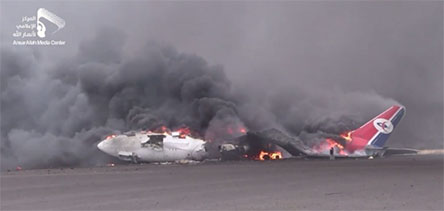Highlights[1]
The Supreme Leader of Iran praised the Palestinian “resistance” in the Gaza Strip and declared that the unity of the Islamic nation is essential to prevent the events taking place in the Gaza Strip and Yemen.
The Iranian embassy in Beirut condemned the IDF attack in the Dahiyeh of Beirut and stressed that Israel’s attacks would not prevent the Lebanese people from continuing to resist.
Iran strongly condemned the continued Israeli attacks in Syria and called on the international community and the countries of the region to act to stop them. Meanwhile, the Iranian media continued to take advantage of the Israeli attacks in Syria to criticize the Syrian president for his “indifference” amid the IDF’s continued activity in his country.
Iran has sent a message to the pro-Iranian Shiite militias in Iraq, calling on them to maintain political unity ahead of the parliamentary elections expected in November 2025.
The Houthis claimed responsibility for 12 attacks against Israel using ballistic missiles and drones. Most of the missiles and aircraft were intercepted, but one ballistic missile exploded in the Ben Gurion Airport area, injuring five people. Israel responded with two airstrikes against the port of Al-Hudaydah, the international airport in Sana’a, and other targets. Iran and the members of the “axis of resistance” praised the Houthis for the attack on Ben Gurion Airport, while Tehran again denied any connection to the Houthis’ activity against Israel.
US President Trump announced the cessation of US attacks against the Houthis, claiming that they had agreed to halt their attacks against naval vessels. The Houthis have made it clear that they will continue their attacks against Israel until the “aggression” against the Gaza Strip stops.
Iran’s position on Palestinian developments
Iranian Supreme Leader Ali Khamenei praised the “steadfastness” of the Palestinians in the Gaza Strip. At a religious event in Tehran, Khamenei said that anyone who stands firm follows in the footsteps of the Shiite imams, and that those who stand firm today in the Gaza Strip and Lebanon are following in the footsteps of those imams (Iranian Supreme Leader’s website, April 24, 2025).
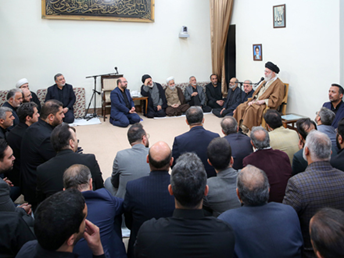
Iranian Supreme Leader Khamenei (April 24, 2025)
Iranian Supreme Leader Khamenei said at a meeting marking the beginning of the pilgrimage to Saudi Arabia (Hajj) that if the Islamic nation had been united, the current disasters in the Gaza Strip and “Palestine” would not have occurred, and Yemen would not have been subjected to such pressure. He noted that division within the Islamic nation is a prerequisite for imposing the interests and aspirations of the colonialists – the United States, the “Zionist regime,” and other countries – on the Muslim nations. Khamenei warned that in a situation of lack of unity, the fate of the Muslim countries could be the same as that of the countries that were under the pressure of colonialism, and their situation could become like that of the Gaza Strip (Iranian Supreme Leader’s website, May 4, 2025).
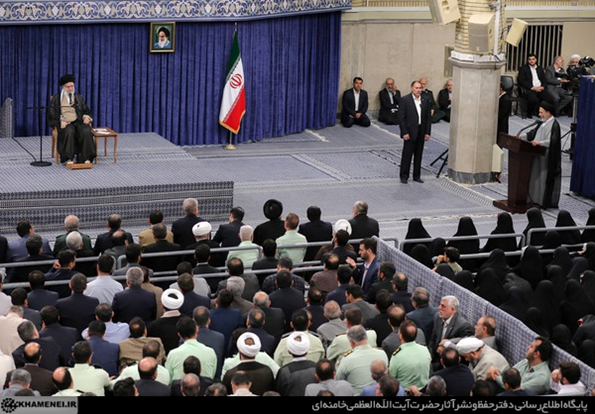
The Supreme Leader of Iran (Iranian Supreme Leader’s website, May 4, 2025)
Iranian Foreign Minister Abbas Araghchi spoke with Indonesian Foreign Minister Sugiono and noted that the “Zionist regime,” with the full support of the United States and several Western countries, has turned the Gaza Strip and the West Bank into an “arena of genocide and torture of innocent Palestinians,” and that it continues its crimes despite the arrest warrant issued by the International Criminal Court and the interim orders of the International Court of Justice. He said that the Muslim countries should be more active in stopping “these crimes” and in delivering humanitarian aid to the Palestinians (Tasnim, April 24, 2025). Araghchi also discussed the Palestinian issue with Algerian Foreign Minister Ahmed Attaf and called for strengthening cooperation and coordination among the Islamic countries to stop the “killing and genocide” of the Palestinian people and prevent the implementation of the “plot to forcibly uproot the Palestinians” from their homeland (Iranian Foreign Ministry website, April 29, 2025).
Iran’s involvement in Lebanon
The Iranian embassy in Beirut condemned the IDF attack on the Dahiyeh on April 27, 2025. The embassy said in a statement that the Israeli attacks proved the essence of Israel and showed that the “Zionists” are accustomed to committing “crimes” and terrorizing citizens. The embassy stressed that Israel’s attacks would not prevent the Lebanese people from resisting the oppression and adhering to their rights (ISNA, April 27, 2025).
Iran’s position on events in Syria
Iranian Foreign Ministry spokesman Esmail Baghaei strongly condemned the continued Israeli attacks in Syria. He said that they prove that Israel’s main goal is to “eliminate and destroy” Syria’s defense and economic capabilities and infrastructure as an independent state so that Israel can realize its ambitions in Syria and the region and continue the “genocide in Palestine” and the “occupation” in Lebanon. He emphasized Iran’s position that Syria’s sovereignty and territorial integrity must be preserved. He called on the international community and the countries of the region to exercise their responsibility to stop the Israeli attacks against Syria (Iranian Foreign Ministry website, May 3, 2025).
Baghaei said that the developments in Syria are concerning and that there is consensus among all the countries in the region regarding the need to take steps to liberate the Syrian territories occupied by Israel, as well as to ensure the integrity and stability of Syria and the participation of all layers of the Syrian people in governing the country. He noted that Iran opposes a situation in which Israel attacks Syria’s strategic assets and economic resources in an “inhumane” manner. He added that the Iranian foreign minister’s special envoy is holding consultations with his counterparts to help preserve and strengthen stability and security in the region. Baghaei stressed that Syria is an inseparable part of security and peace in the region, and therefore Iran will spare no effort to prevent the continuation of the “crimes of the Zionist regime in Syria” (Iranian Foreign Ministry website, May 5, 2025).
Tasnim News Agency, affiliated with the IRGC, accused Syrian President Ahmed al-Shara of turning his country into a base for Israel. It claimed that the Syrian authorities are ignoring Israel’s ongoing occupation of territories in the south of the country and its efforts to dismantle Syria, mainly by supporting the Druze, and to weaken it to force concessions in possible negotiations toward normalization with Israel. It was also stated that al-Shara is allowing Israel to take over his country, giving it the green light to continue its attacks against Syria, and has no intention of confronting it, raising fears among Syrian citizens that their country will become a second Palestine (Tasnim, May 3, 2025).
Iran’s involvement in Iraq
“Iraqi political sources” reported that Iran delivered an urgent message to the “Coordination Framework” of pro-Iranian Shiite militias in Iraq, expressing concern about the split and disagreements within the coordination framework and emphasizing the need to maintain unity of blocs and parties of the framework ahead of the parliamentary elections expected in Iraq in November 2025. The message included clear instructions to the heads of the framework to avoid splits and multiple lists and to maintain the unity of pro-Iranian militias within a joint list to prevent a split in votes in the elections and to ensure that the framework achieves the largest possible number of seats in the next parliament. Iran also called on the heads of the framework to act to persuade Muqtada al-Sadr, who heads the Shiite National Movement, to participate in the elections to prevent instability and to try to exploit the significant voter base of his supporters for the benefit of the coordination framework. According to the report, Iranian officials urged framework leaders to establish communication channels with Sadrist Movement leaders, or at least to appeal to their broad base, by submitting election lists that include figures who are not directly linked to Muqtada al-Sadr but are acceptable to the movement (Shafaq News, April 30, 2025).
Iran’s ambassador to Iraq, Mohammad Kazem Al-e Sadegh, met with Iraqi National Security Advisor Qassem al-Araji and discussed with him the relations between the two countries and the implementation of the security agreement signed between Baghdad and Tehran, which deals with the activities of separatist groups operating against Iran in the Kurdish region of northern Iraq (ISNA, May 6, 2025).
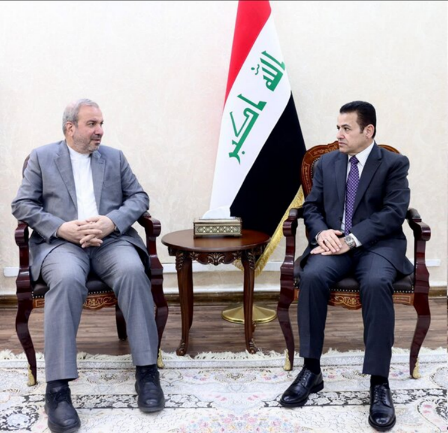
The Iranian ambassador to Baghdad meets with the Iraqi national security advisor
(ISNA, May 6, 2025)
The Houthis in Yemen
The direct confrontation with Israel
During the period under review, Houthi military spokesman Yahya Saria claimed responsibility for 12 attacks against targets in Israel using ballistic missiles and drones. On May 4, 2025, a ballistic missile hit the area of Ben Gurion Airport, following which Saria announced that the Houthi forces are also imposing a blockade on all air traffic to Israel and intend to continue attacks against airports in the country (Yahya Saria’s Telegram channel, April 23-May 7, 2025). The IDF Spokesperson announced five cases of intercepting a single ballistic missile launched from Yemen and six cases of intercepting a single drone launched from the east. However, one ballistic missile exploded in the Ben Gurion Airport area, and five people were lightly to moderately injured (IDF Spokesperson and Israeli media, April 23-May 7, 2025).
In response to the attack on Ben Gurion Airport, the IDF carried out two airstrikes against Houthi targets in Yemen:
On May 5, 2025, targets were attacked in the port of Al-Hudaydah, which, according to the IDF, served as a main source of income for the Houthis and for the transfer of Iranian weapons and other military equipment. It was reported that the port was completely destroyed. A cement factory east of Al-Hudaydah that was used to build tunnels and military infrastructure and was an important source of income was also attacked (Israeli media and IDF Spokesperson, May 5, 2025). The Houthi Ministry of Health reported four dead and 39 wounded in the Israeli attacks. In footage from the scenes, severe damage to the cement factory that was attacked was seen, and significant damage to the Al-Hudaydah port was also reported. However, Houthi Transport Minister Mohammad Ayash Qahim claimed that the port is operating despite the attacks on the docks (Al-Masirah, May 5-6, 2025).
On May 6, 2025, the IDF Arabic Spokesperson called for the evacuation of the entire area of Sana’a International Airport, after which an Israeli airstrike was carried out. It was reported that terrorist infrastructure at the airport was destroyed, in addition to several central power stations in the Sana’a area that provided electricity for the Houthi government. Additionally, the Al-Amran cement factory north of Sana’a, which was used to build tunnels and military infrastructure of the Houthis, was attacked (IDF Spokesperson, May 6, 2025). The Houthi Ministry of Health reported that there are three dead and 35 wounded as a result of the “Israeli aggression” against Sana’a Airport, the cement factory in Amran, the Asr area, and the Haziz power station (Al-Masirah Telegram channel, May 6, 2025). The Yemeni airline reportedly announced the suspension of all its flights to and from Sana’a Airport until further notice due to the “Israeli aggression.” A “source at Sana’a Airport” said that Israel’s attacks completely destroyed the airport, and that three out of seven Yemeni airline planes were destroyed (Al-Araby Al-Jadeed and AFP, May 6, 2025).
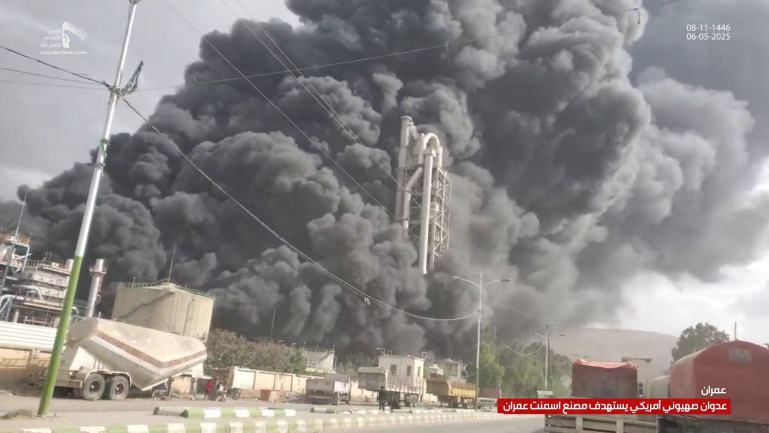
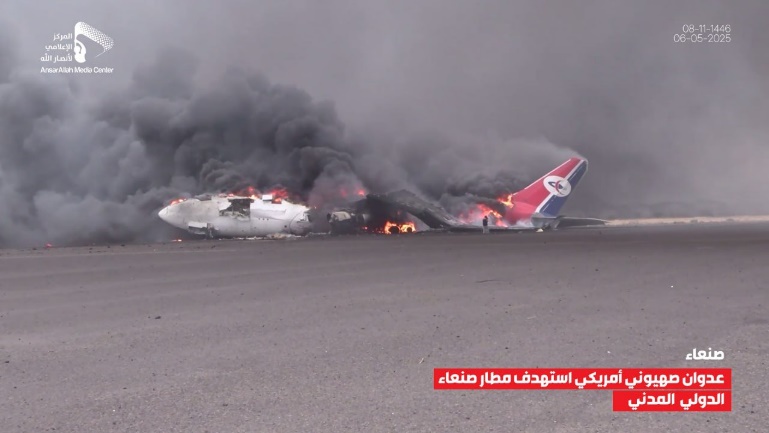
The damage caused by the Israeli airstrikes
(X account of the media arm of the Houthi movement, May 6, 2025)
Senior Houthi officials condemned the Israeli attacks in Yemen. They made it clear that they will continue to act against Israel in “support” of the Palestinians and the Gaza Strip and threatened to attack strategic and civilian targets in various areas of Israel following the successful hit at Ben Gurion Airport. The following are notable statements:
The chairman of the Supreme Political Council of the Houthis, Mahdi al-Mashat, emphasized that they will not back down from their support for the Gaza Strip, regardless of the price they pay. He noted that the response to the “Israeli aggression” will be “devastating,” and that Israel will pay a “heavy price” (Mahdi al-Mashat’s Office Telegram channel, May 6, 2025).
The Houthis’ political bureau claimed that Israel attacked “economic sites” because it failed to reach military sites. It was also reported that the purpose of the “American-Israeli aggression” against Yemen is to stir popular anger. The statement also claimed that “Israel suffered heavy losses as a result of our attack on Ben Gurion Airport” (Al-Arabi, May 5, 2025). Mohammad al-Bukhaiti, a member of the Houthis’ political bureau, threatened after the first Israeli attack that “escalation will be met with similar escalation” until the “aggression” against the Gaza Strip stops. He emphasized that the Houthis are serious about imposing an air blockade on Israel and that the latest attack at Ben Gurion Airport was a “warning.” He noted that the attack on “civilian” areas in Yemen caused heavy casualties, but they will continue to support the Gaza Strip. He added that there are “war crimes” in the Gaza Strip that Israel and the US are trying to cover up by fabricating lies against the Houthis (Al-Arabi, May 5, 2025). After the second attack, al-Bukhaiti said that Israel “crossed the red lines” and that it is trying to impose new laws for the fight, but they are the ones who will impose them. According to him, the Houthis are “subordinate to the Palestinian resistance” and are coordinated with it, and are not subordinate to Iran, and they are ready for any scenario and are prepared to fight on three fronts (Al-Mayadeen, May 6, 2025).
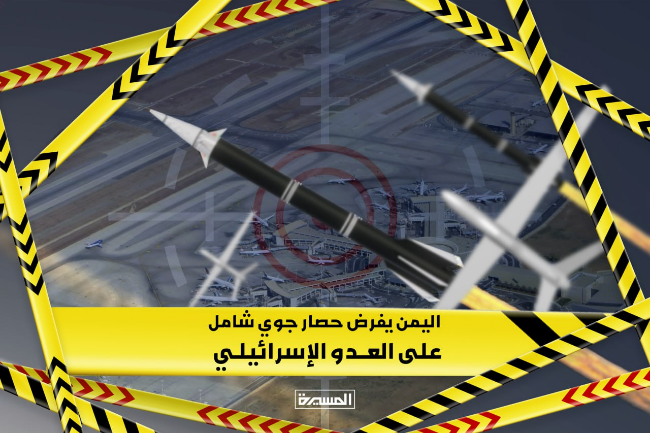
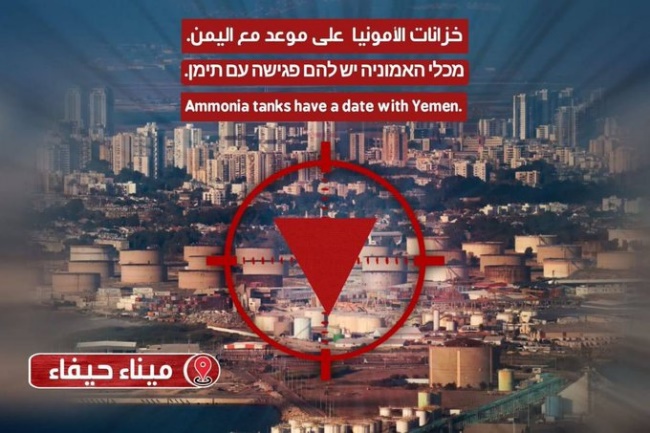
Right: Houthi threat to attack the port of Haifa and the ammonia tanks (Fouad al-Zubayri’s X account, May 6, 2025). Left: Poster with the inscription: “Yemen imposes a total air blockade on the Israeli enemy” (Al-Masirah Telegram channel, May 5, 2025).
Iran and the “axis of resistance” organizations praised the Houthis for the attack on Ben Gurion Airport and condemned the Israeli retaliatory attacks in Yemen:
The Iranian Foreign Ministry welcomed the launch of the missile at Ben Gurion Airport. It was stated that the Yemeni actions in “support” of the Palestinians are carried out based on an independent decision stemming from their sense of human and Islamic solidarity with the “Palestinian brothers,” and that attributing these acts to Iran is a distortion intended to cover up “the crimes of the Zionist regime in occupied Palestine” and to provide an excuse for undermining security in the region. The Iranian Foreign Ministry stressed that “the genocide in occupied Palestine” is the main cause of the continued insecurity in the entire region. It also said that the Iranian people are determined to defend themselves against any “hostile and illegal action” against Iran’s security and national interests and hold the US administration and the “Zionist terrorist regime” responsible for the consequences of any action against Iran (Iranian Foreign Ministry website, May 5, 2025).
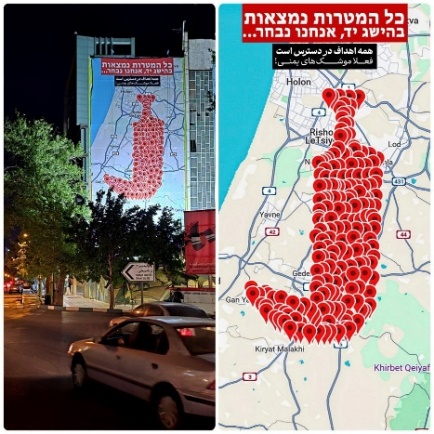
A Hebrew-language propaganda sign hung in Tehran’s Palestine Square after the missile launch from Yemen to Ben Gurion Airport (Mehr, May 4, 2025)
Iranian Foreign Ministry spokesman Esmail Baghaei condemned Israel’s attack on the port of Al-Hudaydah in Yemen and described it as a “clear crime and a flagrant violation of international law.” He called on the international community and the countries of the region to take decisive action to stop the killing and destruction by the US and the “Zionist regime” in Muslim countries. He added that the only way to prevent the spread of instability in the region is to stop the “genocide and crimes of the Zionist regime” in Gaza and to bring the “criminals of the Zionist regime” to justice. A day later, Baghaei also condemned the Israeli Air Force attack on Sana’a Airport (Iranian Foreign Ministry website, May 5-6, 2025).
Hezbollah stated that the missile launch towards Ben Gurion Airport was a “quality operation” that proved the failure of the “American-British aggression” against Yemen and its inability to prevent the support of the people in Sana’a for the Gaza Strip. The organization’s statement also emphasized that the Yemeni “support” for the Gaza Strip despite the “aggression and siege” is a source of pride for the entire nation and obligates all Arab and Islamic countries and peoples to support the Palestinian people with all their capabilities” (Telegram channel of Hezbollah’s Combat Information Arm, May 4, 2025). Hezbollah also condemned the “aggression” against “dear Yemen” and said that it was a “blatant war crime” that violates all international laws, norms, and conventions. The organization also noted that the attacks will only strengthen the support of the “resisting” Yemeni people and cause them to impose “equations” and increase the naval and air blockade on the “Zionist enemy” (Telegram channel of Hezbollah’s Combat Information Arm, May 5, 2025).
Hamas military wing spokesman, Abu Obeida, congratulated the Houthis on hitting Ben Gurion Airport and called Yemen “the twin of Palestine.” According to him, Yemen is increasing the intensity of its attacks in the heart of the “Zionist entity,” despite being subjected to the “aggression of the most evil force” (Abu Obeida’s Telegram channel, May 4, 2025). The Hamas movement stated that the launch of the missile at Ben Gurion Airport expresses Yemen’s steadfast commitment to the Palestinian issue. The movement called on all Arab and Islamic parties to bear their historical responsibility in the victory of “Palestine” and in the defense of the Palestinians (Hamas’ official Telegram channel, May 4, 2025). In a Hamas condemnation of the Israeli attacks against the Houthis, it was said that Israel is trying to repair its image after suffering a significant missile attack and after all its defense systems failed to intercept the Yemeni missile (Hamas’ official Telegram channel, May 5, 2025).
The Palestinian Islamic Jihad (PIJ) praised the “heroism of the Yemeni people” after the missile hit Ben Gurion Airport and their commitment to support the Palestinian people in the Gaza Strip, despite the many casualties (PIJ Telegram channel, May 4, 2025).
Dr. Firas al-Yasser, a member of the political council of the Nujaba Movement in Iraq, praised the Houthis for the “precise and quality” attack against Ben Gurion Airport and noted that Yemen is “the land of steadfastness.” According to him, the attack exposed the weakness of the defense systems, and this opens the way for additional attacks. He added that the US cannot protect the “entity” (Sahafa24.net, May 4, 2025).
US activity against the Houthis
On May 6, 2025, US President Donald Trump announced that the US would stop its attacks against the Houthis after they allegedly “surrendered” and agreed to stop attacks against vessels in the Red Sea (Reuters, May 6, 2025). It was reported that the ceasefire was achieved amid negotiations between the US and Iran on the nuclear program, and that Iranian pressure was exerted on the Houthis to agree to the conditions. It was also reported that Oman mediated between the US and the Houthis, and it was agreed that neither side would attack the other and that commercial maritime passage in the Red Sea and the Bab el-Mandeb Strait would be ensured (CNN and New York Times, May 6, 2025).
Houthi leaders confirmed that an agreement was reached regarding the cessation of American attacks, but they emphasized that they intend to continue attacks against Israel as long as the “aggression” against the Gaza Strip continues.
According to Houthi spokesman Mohammed Abd al-Salam, Yemen’s actions in “support” of the Gaza Strip will not stop and will be even better because of the cessation of “American aggression.” He said that they had received the American requests through Oman, saying they had nothing to do with the Houthis’ position on the Gaza Strip, and stressing that the Houthis had not submitted any requests on their part. Abd al-Salam expressed appreciation for the American position but made it clear that if the “aggression” was renewed, they would also resume attacks (Al-Masirah, May 6, 2025).
Mohammad Ali al-Houthi, a member of the Houthis’ political bureau, said that the Yemeni actions constituted and still constitute “support” for the Gaza Strip to stop the “aggression.” According to him, the Houthi forces stressed that their actions against American ships were in response to the American “aggression” aimed at stopping “support” for the Gaza Strip. He stressed that they would examine on the ground President Trump’s declaration of the cessation of “aggression” (Mohammad Ali al-Houthi’s X account, May 6, 2025).
During the period under review, until President Trump’s announcement, US forces continued to attack military targets of the Houthis in areas controlled by the movement in Yemen. “Sources in Yemen” reported that the attacks were directed against targets in many governorates, including the main governorates of Sana’a, Saada, and Al-Hudaydah, included military facilities above and below ground, airports, missile and drone facilities, weapons stores, and civilian infrastructure (Arab and Houthi media, April 23-May 7, 2025). On April 28, 2025, the US Central Command (CENTCOM) updated that since the beginning of the operation on March 15, 2025, more than 800 targets have been attacked and hundreds of Houthi fighters and many senior officials in the movement have been killed, including senior officials in the missile and drone arms. It was also noted that the number of ballistic missile launches has dropped by 69%, and the Houthi drone attacks have declined by 55%. The announcement also said that Iran continues to provide support to the Houthis (CENTCOM X account, April 28, 2025).
On April 30, 2025, British Secretary of State for Defence John Healey said that Royal Air Force fighter jets attacked Houthi military targets in Yemen for the first time since US attacks began on March 15, 2025. He noted that the attacks were carried out with American assistance to damage the Houthis’ capabilities and to prevent additional attacks against Britain and against international trade (British Ministry of Defence X account, April 30, 2025). The Houthi government warned that the “British enemy” will bear the consequences of the attacks, adding that as long as the provocations continue, Yemen will attack the ships of the “American-British-Israeli triangle of evil” (Ansar Allah Telegram channel, April 30, 2025).
Iranian Foreign Ministry spokesman Esmail Baghaei strongly condemned the continuation of American attacks in Yemen and described them as a flagrant violation of Yemen’s sovereignty and territorial integrity that contradicts the UN Charter and international law. He noted that the attacks are considered “war crimes and crimes against humanity” because they are directed at residential areas and vital infrastructure in the country. He called on the UN Security Council to take action in light of the continuation of American and Israeli attacks in the region (Iranian Foreign Ministry website, May 3, 2025).
During the period under review, Houthi military spokesman Yahya Saria claimed responsibility for three attacks against the American aircraft carriers USS Vinson and USS Harry S. Truman and the warships accompanying them in the Red Sea and the Arabian Sea, using ballistic missiles, cruise missiles, and drones. The Houthis also claimed that they managed to shoot down an American F-18 fighter jet (Yahya Saria’s Telegram channel, April 23-May 7, 2025). The US military confirmed that an F-18 plane fell into the sea from the aircraft carrier USS Harry S. Truman and that one sailor was slightly injured (Reuters, April 28, 2025). An “American source” reported that the fighter jet fell from the aircraft carrier while trying to evade Houthi fire (Al Jazeera, April 28, 2025).
Houthi leader Abd al-Malik al-Houthi said in a videotaped speech that actions against the “Israeli enemy in the depth of occupied Palestine” continue, and the “American enemy” is unable to stop them. He added that the confrontation with American vessels continues and that they are foiling many actions of the “enemy.” Al-Houthi claimed that the US is failing to achieve its goals, as it has not succeeded in weakening or eliminating the Houthis’ capabilities, stopping their actions, and breaking the will of the people, and that it will bear the severe consequences of its “aggression” (Al-Masirah Telegram channel, May 1, 2025).
On May 4, 2025, Mahdi al-Mashat, the chairman of the Houthi Supreme Political Council, convened a meeting of the leadership of the Ministry of Defense, the chief of staff, and military commanders. Al-Mashat said that they warned the Americans indirectly, but they did not respond “because they don’t care about the lives of the Zionists.” He also said that “the confrontation has become between Jews and Muslims,” and that “the intelligence of the American enemy is exposed to the Yemeni army and it cannot prevent it” (Saba News Agency; Official Telegram channel of the Yemeni Presidency Office, May 4, 2025).
On April 28, 2025, the US Treasury Department announced that the US imposed new sanctions on three vessels and their owners for transferring gas and oil products to the Houthis in Yemen. It was also reported that the sanctions were directed at two shipping companies in the Marshall Islands and another shipping company in Mauritius because their ships unloaded their cargo at the Houthi-controlled port of Ras Issa (US Treasury Department website, April 28, 2025).
[1] The weekly study includes the activities of Iran, the Shiite militias in Iraq, and the Houthis in Yemen.
Related Articles
